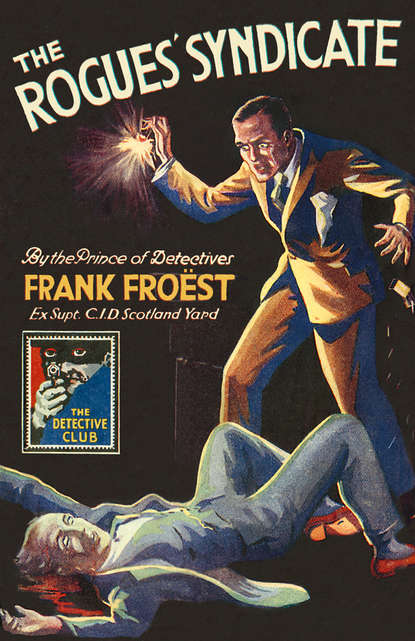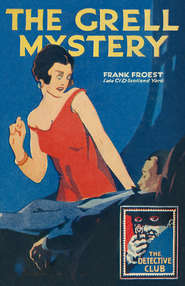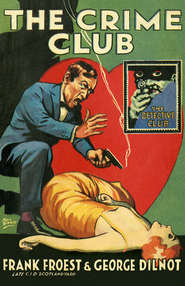По всем вопросам обращайтесь на: info@litportal.ru
(©) 2003-2024.
✖
The Rogues’ Syndicate: The Maelstrom
Автор
Год написания книги
2019
Настройки чтения
Размер шрифта
Высота строк
Поля
‘I am quite sure you only meant to save me possible future unpleasantness. Is there anything else? You have my address.’
‘There is no other way at the moment in which you can help. As matters develop, I may call on you. It has been very good of you—’
She stretched out her slim, gloved hand to Hallett. But he was not inclined to let her escape so easily. She owed him something, if only an explanation.
‘I am going your way,’ he said, unblushingly. ‘Perhaps, if you don’t mind—’
Menzies stroked his moustache, and his eyes roved sideways to his aide-de-camp, Royal, who, after an absence of two or three minutes had now returned. Royal nodded almost imperceptibly, and the inspector said good-bye.
‘By the way, you had better be at the police court at two, Mr Hallett. We shall charge this man Smith today. I don’t expect you’ll be kept long. It will be purely formal. I shall apply for a remand.’
Hallett and the girl went down the steps to the street. He was conscious that, though she appeared to be gazing serenely in front of her, she occasionally scrutinised him with curious eyes.
Not till they were a hundred yards away from the police-station did either of them speak again. Then Jimmie ventured on the ice.
‘Perhaps now you will tell me what it’s all about?’
‘Oh!’ She stopped and turned full on him with wide-open, innocent blue eyes of a child. ‘So you knew all the time? I wasn’t sure.’
‘Wasn’t sure that I knew you as the girl in the fog?’
‘Yes. Shall we walk on? We might attract attention standing here. Why did you do it? Why didn’t you denounce me?’
Jimmie twiddled his walking-stick.
‘Hanged if I know!’ he confessed. Her self-possession rather daunted him. ‘I thought—that is—if you wanted to you would have explained the incident yourself.’
‘That’s no reason. You didn’t know me. There was no earthly motive. All the same, I am grateful to you, Mr Hallett—sincerely grateful.’
She sighed.
A porter with a parcel under his arm loitered three yards behind them. Ten yards behind him a ‘nut’, scrupulously dressed and seeming conscious of nothing but the beauty of his attire, swaggered aimlessly. Menzies, as has been said, was not a man who took anything for granted. His arrangements for ‘covering’ Peggy Greye-Stratton in the event of Hallett not recognising her had been completed long before he had confronted them in the charge-room.
Hallett might have guessed—if he had thought about it at all. The girl certainly did not. Jimmie caught at her last words.
‘You can prove that. Although we have only been formally introduced in the last five minutes, we are not exactly strangers. Come and lunch with me. Then we can talk. There are several things I want to know.’
She assented, it seemed to him, somewhat indifferently. He hailed a taxi-cab, and gave the name of a famous restaurant. As she sank back in the cushions it was as though a mask had dropped from her face. It had suddenly become utterly weary. She gasped once or twice as if for breath. Only for an instant had the mask dropped, but Hallett had seen and understood. The girl was strained to breaking-point, supporting her part only by strength of will.
What that part was, and why she was playing it, he was fixed in the resolution to learn. He spoke on indifferent subjects till lunch was over and coffee was brought. Then he leaned forward a little across the table.
‘I shall be glad if I can be of any help to you, Miss Greye-Stratton,’ he said.
A smile, palpably forced, appeared on the girl’s face. She twisted a ring on her finger absently.
‘That is a polite way of bringing me to the point, Mr Hallett. You have a sort of right to ask.’
A sigh trembled on her lips, and her eyes became absent. The man said nothing, but waited. Very dainty and desirable did Peggy Greye-Stratton seem to him then. Yet he would not have been human if he had not had misgivings. Her very reluctance to speak aroused a little spark of suspicion which he deliberately trampled under foot. A beautiful face, a high intelligence, and courage—and all these he knew she possessed—are not necessarily guarantees against crime.
She appeared to come to a resolve.
‘I will tell you what I told Mr Menzies,’ she said, looking up. ‘Knowing what you knew, it will seem incomplete to you, but you’—she looked him full in the face—‘are a gentleman. I trust you not to question me too far. There are—other people.’
He, too, had come to a resolve.
‘Tell me,’ he said levelly, ‘before you say anything else, did you have act or part in the murder of your father?’
She stared at him whitely and half rose. Her shapely throat was working strangely.
‘Do you think—’ she began. And then tensely: ‘No, no, no!’ Her voice fell to a strained whisper. ‘Why do you ask me that? If I had known—if I could have prevented—’
She was rapidly becoming distraught.
He felt himself a cur, but he pressed home the question relentlessly.
‘Do you know who it was that murdered your father?’
Her fair head fell to her arms on the table. Had Hallett known, he could not have put his questions at a time more likely to wring an answer from her. All that morning she had borne herself before the keen eyes of Menzies and his assistants, conscious that the slightest falter might betray what she did not wish known. Her nerves were now paying the penalty. She raised a face torn with emotion towards Hallett.
‘God help me!’ she moaned. ‘I believe I do.’
CHAPTER VII (#ulink_c1d4ec2b-5b58-5202-9b58-45bfca3c2b1a)
HE had expected the answer, and yet is came to him as a shock. She was regarding him with an expression half-defiant, half-appealing. His eyes wandered round the room. He had engaged a table that stood in a recess behind one of the marbled pillars, and they were thus separated from the general company in the room. Their voices had been low, but he was afraid they might have attracted attention. But no one seemed to have observed them, and he turned once more to her.
Somehow she had repressed her weakness. He signalled to the waiter, and ordered a liquer. As she took it, he observed that her hand was perfectly steady. And yet but a moment before she had been on the verge of hysterics.
‘Tell me just what you like,’ he said simply. ‘Just as much or as little as you like. You can trust me.’
‘Thank you,’ she said, ‘you are very good. Let me think. To begin with, you must know my father was a very strange man. When I was quite a baby he quarrelled with my mother, and I was sent down into the country, where I lived with an old gentleman-farmer and his wife named Dinward. I always understood that I was their child until a few years ago—they never spoke of either my father or my mother. Once—just before I went to school—he came to see me. I, of course, did not know whom he was.
‘I was sent to a convent school at Bruges, where I was brought up, coming home for the holidays—home, of course, being in Sussex. Occasionally I was brought to London. I won’t go into all the details of my life until I left school—it wouldn’t interest you. All this time, remember, I had no knowledge of any relations but the Dinwards. When I left school, I learnt for the first time that I was not their daughter. Mr Pembroke, a solicitor, came over to Bruges and told me very nicely. But—acting on instructions, he said—he could give no clue to my parents. There would be three hundred a year—about fifteen hundred dollars in your currency—payable to me quarterly by his firm. I was no longer to look to the Dinwards for support.
‘Mr Pembroke was very nice, but he had his instructions. I asked him what I was expected to do. “I presume,” he said, “that your”—he could not think of a word at first—“benefactor intends that you shall have enough to support you respectably. Think over your plans tonight, my dear young lady, and we will talk it over in the morning.”
‘I did think it over, you may imagine. I slept little that night. I have a certain facility for painting, and that seemed to me to offer an outlet to ambition. I told Pembroke next day; he expressed neither approval nor disapproval. A cheque, he said, would be waiting for me at the offices of his firm on the first day of every quarter. He offered to give me introductions in London, but I answered that the only introduction I needed was to my parents. He shook his head a little doubtfully, and that ended the conversation.
‘I wanted to see the world a little before I settled down in London. I went to see the Dinwards, but no word could I get from them as to whom I really was. They were kindly people, but not simple. They would tell me nothing. Perhaps, if I had then been less of a raw child, if I had had more knowledge of the world, I might have got round them. Later on someone—but I am coming to that.
‘The Dinwards were troubled about me, naturally. Of course, I promised to keep in touch with them. I changed my name. I had been called Peggy Dinward; I became Lucy Olney. That, by the way, Mr Hallett, is the name I still keep.
‘The allowance I was to receive seemed a tremendous fortune to me. I went abroad—to study art, I told myself. I went to Paris, to Rome, to Venice, and other places; but the money did not prove so ample as I expected. Perhaps I was extravagant. Anyway, in about eight months I was in London, determined to make my fortune, and I still thought that my art pointed the way.
‘You will guess that I had some troubles. Art for art’s sake is one thing, but I am afraid I haven’t the true temperament. I wanted recognition, and, though I could have existed without the money, I wanted money as a proof that I was recognised. But no one seemed to appreciate me as a genius. It was difficult enough to get dealers to take my pictures at a price that barely paid for canvas and paint. Then I drifted into magazine and book illustration work, and at that I found my metier. I earned much more than I really needed, even without my allowance.’
She fingered a serviette absently for a moment. There was an abstraction in her eyes. Hallett waited, without interruption, for her to resume.
‘I have not told you that I have a step-brother,’ she went on. ‘Indeed, I did not know it myself till two years ago. He is my mother’s son by her first marriage, and is much older than myself. He was sent abroad at the time that I was handed over to the Dinwards. As I say, two years ago he traced me out; I believe he got my adopted name and my address from the Dinwards. It was from him that I first learned who I was, who my father was, who my mother was. He told me the whole terrible story of Mr Greye-Stratton’s—I can’t call him my father—break with my mother. He swore that she was innocent, that it was a madman’s fit of jealousy that broke up the home. I—I—’







